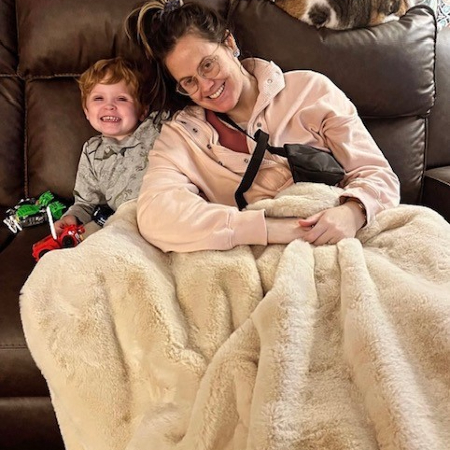Sleep
We spend upwards of one third of our lives sleeping, and regular, restful sleep
is critical to our well-being: physically, emotionally, and mentally.
Sleep
We spend upwards of one third of our lives sleeping, and regular, restful sleep is critical to our well-being: physically, emotionally, and mentally.
Sleep
We spend upwards of one third of our lives sleeping, and regular, restful sleep is critical to our well-being: physically, emotionally, and mentally.
Unfortunately, our sleep is often disrupted by our busy lives. Work, stress, packed schedules, and raising children are just a few of the reasons people get less sleep than they should. Add on a diagnosis of colorectal cancer, and you may find that your sleep time has taken a serious hit.
Sleep is crucial to healing, so ensuring that you have time set aside every night for good, restorative sleep is critical, Unfortunately, cancer treatment and sleep problems can go hand in hand. If you’re having trouble sleeping, it’s important to identify the problem so it can be addressed by you and your care team.
Unfortunately, our sleep is often disrupted by our busy lives. Work, stress, packed schedules, and raising children are just a few of the reasons people get less sleep than they should. Add on a diagnosis of colorectal cancer, and you may find that your sleep time has taken a serious hit.
Sleep is crucial to healing, so ensuring that you have time set aside every night for good, restorative sleep is critical, Unfortunately, cancer treatment and sleep problems can go hand in hand. If you’re having trouble sleeping, it’s important to identify the problem so it can be addressed by you and your care team.
Unfortunately, our sleep is often disrupted by our busy lives. Work, stress, packed schedules, and raising children are just a few of the reasons people get less sleep than they should. Add on a diagnosis of colorectal cancer, and you may find that your sleep time has taken a serious hit.
Sleep is crucial to healing, so ensuring that you have time set aside every night for good, restorative sleep is critical, Unfortunately, cancer treatment and sleep problems can go hand in hand. If you’re having trouble sleeping, it’s important to identify the problem so it can be addressed by you and your care team.
Common sleep issues
Unfortunately, a lot of people struggle with sleep. Here’s a few common sleep issues:
You might not ever receive a formal diagnosis for why you have trouble sleeping, but that doesn’t mean your problems aren’t real and can’t be addressed. People undergoing treatment for cancer may find that a variety of issues prevents them from sleeping well, including but not limited to:
The important thing is to make sure your care team knows you are having trouble sleeping sooner than later so your problem can be addressed. Hopefully, the root cause of your sleep issue can be addressed directly, such as managing pain or reducing your stress levels. There are also medications that can be prescribed, if appropriate, to help you get more restful sleep.
Common sleep issues
Unfortunately, a lot of people struggle with sleep. Here’s a few common sleep issues:
You might not ever receive a formal diagnosis for why you have trouble sleeping, but that doesn’t mean your problems aren’t real and can’t be addressed. People undergoing treatment for cancer may find that a variety of issues prevents them from sleeping well, including but not limited to:
The important thing is to make sure your care team knows you are having trouble sleeping sooner than later so your problem can be addressed. Hopefully, the root cause of your sleep issue can be addressed directly, such as managing pain or reducing your stress levels. There are also medications that can be prescribed, if appropriate, to help you get more restful sleep.
Common sleep issues
Unfortunately, a lot of people struggle with sleep. Here’s a few common sleep issues:
You might not ever receive a formal diagnosis for why you have trouble sleeping, but that doesn’t mean your problems aren’t real and can’t be addressed. People undergoing treatment for cancer may find that a variety of issues prevents them from sleeping well, including but not limited to:
The important thing is to make sure your care team knows you are having trouble sleeping sooner than later so your problem can be addressed. Hopefully, the root cause of your sleep issue can be addressed directly, such as managing pain or reducing your stress levels. There are also medications that can be prescribed, if appropriate, to help you get more restful sleep.
Tips for Better Sleep
These methods can be safely used and may improve side effects. Remember: All people are different and respond to treatments differently. Before seeking these approaches, talk to your doctor to make sure it’s safe for you!

Tips for Better Sleep
These methods can be safely used and may improve side effects. Remember: All people are different and respond to treatments differently. Before seeking these approaches, talk to your doctor to make sure it’s safe for you!


Tips for Better Sleep
These methods can be safely used and may improve side effects. Remember: All people are different and respond to treatments differently. Before seeking these approaches, talk to your doctor to make sure it’s safe for you!
Learn more about Complementary and Alternative Medicine (CAM).
Learn more about Complementary and Alternative Medicine (CAM).
Learn more about Complementary and Alternative Medicine (CAM).




